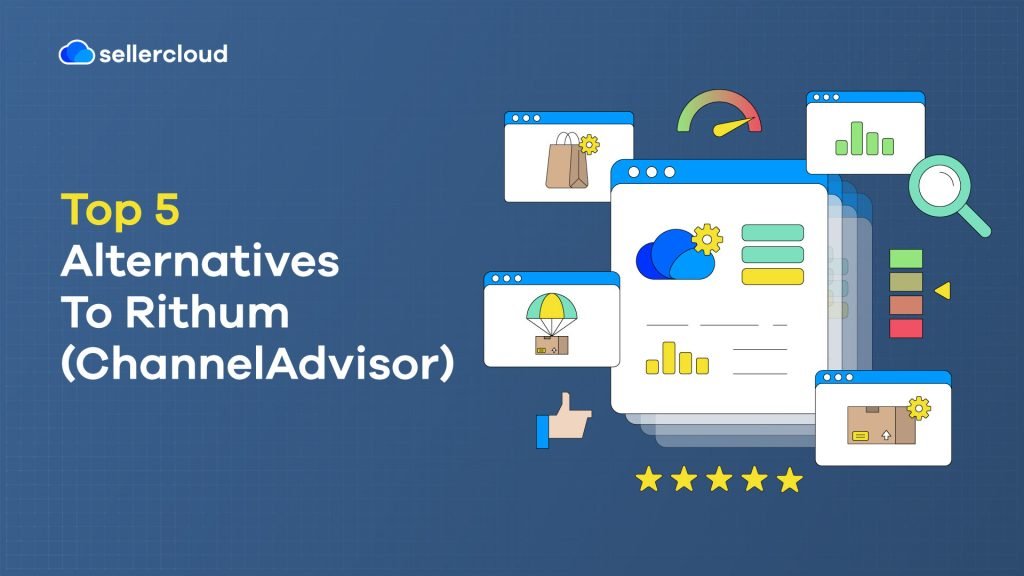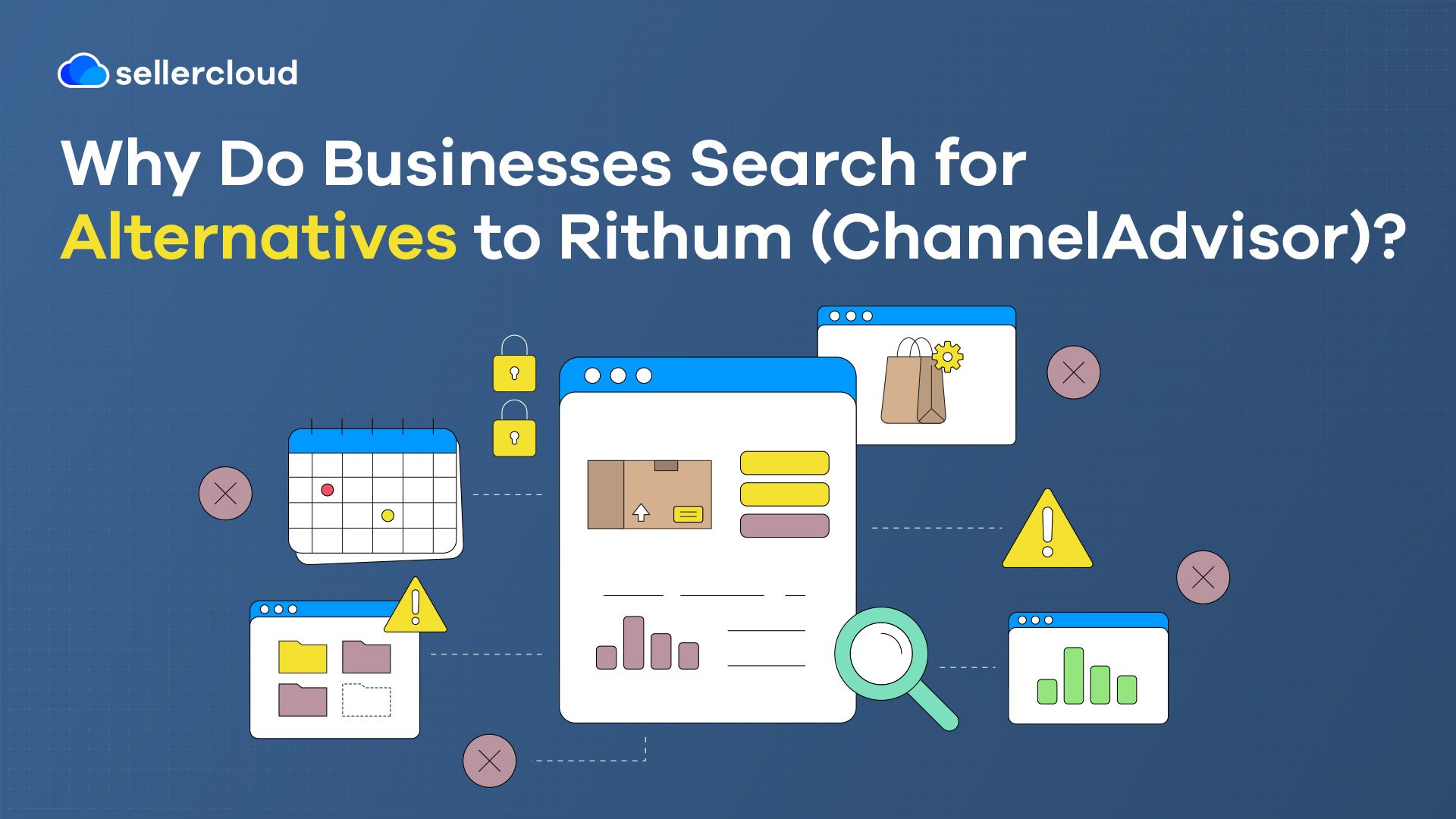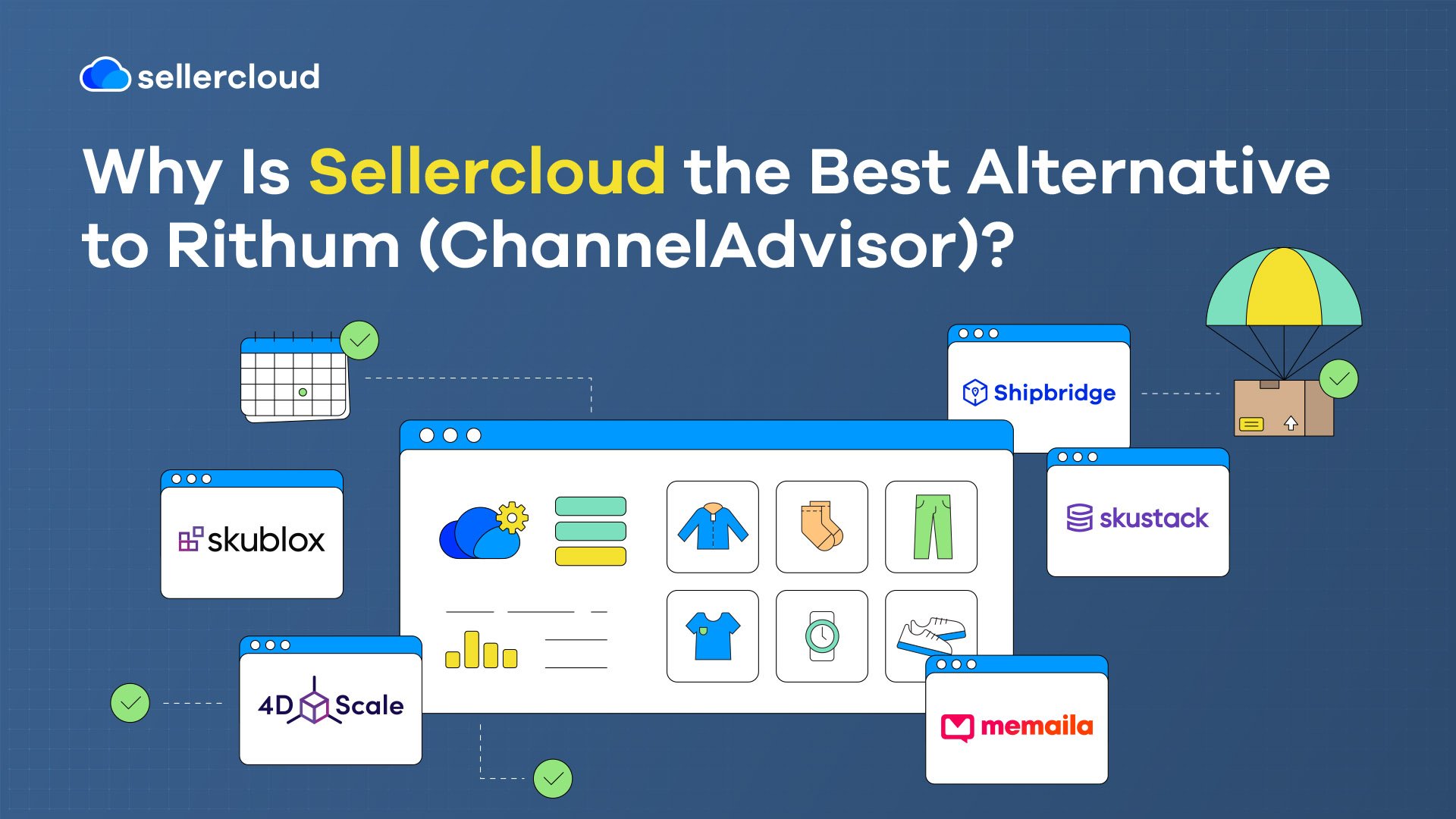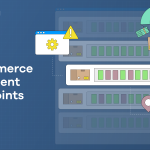
Rithum, known as ‘ChannelAdvisor’ until late 2023, is an established ecommerce platform that helps online merchants sell products to customers online. It is one of the oldest examples of such a service with users worldwide.
However, many customers are looking for alternatives because of the immense costs of Rithum (ChannelAdvisor).
Furthermore, Rithum (ChannelAdvisor) has yet to catch up with various features offered by newer competitors that have become the standard.
In this article, we’ll examine the top five alternatives to Rithum (ChannelAdvisor), discuss their pros and cons, and why sellers seek alternatives.
What Are the Best Alternatives to Rithum (ChannelAdvisor)
Here are the top five alternatives to Rithum (ChannelAdvisor).
1. Sellercloud
Sellercloud was founded in 2010 by Jeremy Greenberg, who recognized the ecommerce market needed a solution to help businesses sell seamlessly across multiple platforms.
What makes Sellercloud stand out from other Rithum (ChannelAdvisor) competitors is that it takes customer feedback seriously. In fact, almost all of Sellercloud’s top features have been built directly from seller feedback.
This allows Sellercloud to offer basic but important functionality, such as multi-warehouse support, and more complex tools and features, like predictive purchasing.
As of 2023, Sellercloud has over 1,000 customers, handles $15 billion in annual GMV (Gross Merchandise Volume), and processes over 150 million annual orders.
Top Reasons to Consider Sellercloud:
- Customizable with a dedicated team for customization.
- 350+ integrations, including all major marketplaces.
- Sweeping shipping features and software (Shipbridge) are available at no extra cost and are integrated with all major shipping carriers and consolidators.
- Substantial reporting features.
- Excellent variety of warehouse management features, including Skustack WMS (Warehouse Management System).
- Amazon Software Partner with a wide range of Amazon features.
What Do Customers Have to Say about Sellercloud?
“[Sellercloud] is one of the best task/inventory managers I have ever had. [Sellercloud] helps us manage our inventory to ensure that our stocks are updated. It also helps us drive sales and account performance.”
– Reymar G., admin, mid-market (51-1000 employees).
For more about what Sellercloud customers say, check out Sellercloud’s Case studies and testimonials.
What’s Sellercloud’s Pricing?
Sellercloud is very open about its pricing. The pricing page provides a transparent breakdown of the costs involved so you can figure out how much it would cost your business. With a pay-per-order model and no hidden fees, you’ll always have full cost transparency.
Another aspect that makes Sellercloud stand out against Rithum (ChannelAdvisor) is its fully integrated suite of solutions, which sync across all your systems in real-time.
By listening to the needs of the businesses using Sellercloud, it has become an ecosystem of solutions, in addition to its flagship Sellercloud product.
For example, Sellercloud offers a WMS integrated with your Sellercloud account in real time called Skustack.
The best part? They’re affordable for any business. Check the Skustack pricing page and Skublox pricing page to see how much they will cost your business.
Lastly, unlike many competitors, Sellercloud does not charge for implementation or additional integrations.
Request a demo to see just how advanced Sellercloud is.
Compare Rithum (ChannelAdvisor) to Sellercloud.
2. Cin7
Cin7 is a cloud-based ecommerce platform that helps businesses with inventory management, payments, and POS (Point of Sale) software, among other things.
Founded in 2002, Cin7 originates from Auckland, New Zealand, and has started to gain traction in the US. Today, Cin7 serves approximately 8,000 customers in 75 countries and claims to handle over 125 million orders annually.
Top Reasons to Consider Cin7:
- 700+ integrations.
- Various ordering features.
- Wide selection of reporting features.
Limitations of Cin7:
- Sellers have to request marketplace integrations. Once enabled, then they can be configured.
- No shipping software whatsoever, so you will need an additional solution for shipping.
- No customization. Cin7 is not meant to be customized.
- No option to use shadow listings.
- No automatic kit creation.
- No custom inventory calculations.
- Unable to link POs (Purchase Orders) to FBA shipments nor send POs straight to FBA from vendors.
- Does not offer a fully integrated sorting and order fulfillment system.
- Does not offer a fully integrated smart scale.
- Unable to consolidate FBA shipments nor use Amazon’s Buy Shipping In Bulk feature.
What Do Customers Have to Say About Cin7?
“Cin7 has really helped us scale our business. It is easy to use. I set it up and use it daily. It integrates well with Xero and Shopify. The B2B website helps our customers order by themselves. You can integrate with Amazon FBA and Vendor (EDI) plus [all sorts] of other Marketplaces.”
– Sporting goods vendor, small business (50 or fewer employees).
What Is Cin7’s Pricing?
Cin7 charges customers a $349 monthly minimum. However, many other costs are involved that also need to be considered. These include:
- Point of Sale, Cin7 Core Native.
- B2B Portal, Cin7 Core Native.
- API Access for Integrations.
- Ecommerce and App Integrations.
- Users.
- Workflow, Approval, and Notification Automations.
- Advanced Manufacturing Module.
Implementation is also paid. Cin7 charges $750 for a group and $1,500 for personal implementation.
How Does Cin7 Compare to Rithum (ChannelAdvisor)?
Cin7 outperforms Rithum in almost every area, offering many features that are unavailable to Rithum (ChannelAdvisor) users at a much lower price. The only feature you might miss is Amazon’s blank box fulfillment option, which is unavailable to Cin7 customers.
Some of the biggest differences between Rithum (ChannelAdvisor) and Cin7 offerings include warehouse functionality, such as inventory tracking and virtual warehouse options.
You will also get purchasing features (Rithum doesn’t offer any), and Cin7 also offers far more advanced reporting features—with Rithum (ChannelAdvisor), you can’t get reports on much more than P&L, sales, and orders.
However, it is important to point out that Rithum (ChannelAdvisor) and Cin7 don’t offer shipping features, and neither can be customized.
3. Deposco
Founded in 2004 in Alpharetta, Georgia, Deposco’s ecommerce software is called ‘Bright Suite’ (not to be confused with Brightpearl, another ecommerce software provider).
Deposco supposedly has 3,000 customers and handles approximately 43 million orders annually.
Top Reasons to Consider Deposco:
- 200+ integrations.
- A solid variety of shipping features.
- Nice selection of reporting features.
Limitations of Deposco:
- WMS is not very user-friendly. Deposco did not build its WMS and is now trying to make it work with its system.
- Some integrations are paid.
- No customization.
- No 24/7 emergency line phone support.
- Doesn’t allow sellers to manage all their multi-channel listings in one place.
- Cannot retrieve product info from multiple sources, such as Amazon listings and vendor feeds.
- Doesn’t allow sellers to manage refunds and cancellations across all marketplaces.
- No shipping cost, inventory aging, settlement reconciliation, or accounts receivable reporting.
- Sellers cannot auto-generate order emails to customers.
- Doesn’t allow sellers to set shipping preferences for each product.
What Do Customers Have to Say About Deposco?
“This system is great for procurement and warehouse management. We use this to keep all of the buying and customer needs in one place.”
– Marketing and advertising business, small business (50 or fewer employees).
What Is Deposco’s Pricing?
Deposco provides quotes based on your business size and usually costs between $50,000 to $65,000 a year.
However, it’s important to note that Deposco requires a minimum three-year contract. So, if you agree to use Deposco, you could be locked into a $150,000 to $195,000 contract.
If you decide to implement Deposco, they charge a $200 hourly implementation fee.
While this might not sound too bad, the average implementation takes approximately 700 hours. This means you could end up paying up to $140,000 (or more) to implement Deposco.
Deposco also charges for some integrations, though these costs have not been disclosed.
How Does Deposco Compare to Rithum (ChannelAdvisor)?
While Deposco is a good alternative to Rithum (ChannelAdvisor), there is a bit of a trade-off between the two in certain areas.
For example, though Deposco offers vital shipping and purchasing features unavailable to Rithum (ChannelAdvisor) customers, Rithum has more integrations and allows customers to manage their multi-channel listings in one place—a key feature for many sellers.
However, all in all, Deposco beats Rithum (ChannelAdvisor) as it also enables customers to set dropshipping preferences on each product and a more comprehensive list of inventory features, including a native WMS with multi-warehouse management and low stock alerts.
While both choices are not particularly cost-efficient, many potential customers will likely be turned off by Deposco’s three-year minimum contract, which can be highly costly if their platform is a poor fit for their business.
Compare Deposco to Sellercloud.
4. Brightpearl
Brightpearl has approximately 1,400 customers worldwide and claims to handle 3 million monthly orders. Founded in 2007, Brightpearl was acquired by Sage in 2022.
Though Brightpearl refers to itself as a ‘Retail Operating System,’ know that it is ERP (Enterprise Resource Planning) software, which is typically more complex, expensive, and includes features sellers will not need.
Top Reasons to Consider Brightpearl:
- 200+ integrations.
- Acceptable ordering and purchasing features.
- Email, ticket, and 24/7 emergency line phone support.
Limitations of Brightpearl:
- Cannot manage all your multi-channel listings in one place.
- No shipping features at all.
- Complex workarounds for kitted products and variations.
- Like other alternatives, Brightpearl cannot be customized.
- No premium or platinum support options.
- No multi-warehouse management.
- No returns and refunds, shipping costs, inventory aging, products by kit components, or financial transaction reports.
- Does not offer a native WMS.
- Does not allow sellers to update inventory from vendor feeds.
- No option to manage refunds and cancellations across marketplaces.
What Do Customers Have to Say About Brightpearl?
“We’ve been with Brightpearl (BP) for many years. Before BP we knew our stock very well, but being with BP took us to a whole new level. Having very accurate stock levels, as well as much more efficient ordering, leads to being able to offer a better customer service experience and helps boost turnover.”
– Andrew C., small business (50 or fewer employees).
What Is Brightpearl’s Pricing?
Brightpearl’s pricing is quotation-based and modular. Most Brightpearl quotes start from $10,000 monthly, supposedly only charging customers for what they need.
Like Deposco, some of Brightpearl’s integrations are paid.
Brightpearl is not transparent in its pricing. Potential customers must contact Brightpearl first to get a quote.
How Does Brightpearl Compare to Rithum (ChannelAdvisor)?
Moving from Rithum (ChannelAdvisor) to Brightpearl, you will lose the ability to manage multi-channel listings from one interface and will have access to fewer integrations. However, ultimately, you will have more features to help you with your day-to-day operations.
If you decide to transition to Brightpearl, the biggest improvements you will see will be in the warehouse, where you can track inventory and virtual warehouse options.
On top of that, you will gain access to a wealth of previously unavailable purchasing features, such as creating and receiving POs, predictive purchasing, and PO and RMA receiving software at no extra cost.
Do remember whether you prefer Brightpearl or Rithum (ChannelAdvisor), you will be left without shipping features and must find an additional service to fill that need.
Compare Brightpearl to Sellercloud.
5. Extensiv
Extensiv is another ERP that has been around since 2006 and is headquartered in El Segundo, California. They claim to have over 4,000 customers and help customers with 3 million orders weekly.
Top Reasons to Consider Extensiv:
- Can handle the majority of inventory management tasks.
- Offers ordering and purchasing features.
- Inventory tracking throughout the warehouse.
Limitations of Extensiv:
- Minimal catalog features.
- No shipping features.
- Like Brightpearl, Deposco, and Cin7, Extensiv does not offer customization.
- No 24/7 emergency line phone support, email support, or premium or platinum support options.
- Limited Amazon options beyond direct FBA fulfillment and Amazon multi-channel fulfillment.
- Sellers cannot link POs to FBA shipments, send POs straight to FBA from vendors, or clone POs.
- Has a 125,000 SKU limit.
- Does not offer RMAs.
- WMS is notoriously tricky to implement.
- No reporting on returns and refunds, shipping costs, inventory aging, products by kit components, or financial transactions.
What Do Customers Have to Say About Extensiv?
“I have been a customer for over 5 years and the support has never let me down. Their products literally changed the way we do business and skyrocketed our sales through the roof.”
– Chris M., small business (50 or fewer employees).
What Is Extensiv’s Pricing?
Extensiv charges customers between $999 and $2,000 for the first 5,000 orders. Implementing Extensiv is costly, and it will cost between $1,500 and $5,000.
Extensiv also has several ‘integration manager’ plans:
- Merchant, $39 monthly.
- EDI Merchant, $99 monthly.
- 3PL, $99 monthly.
- Master Account, $199 monthly.
How Does Extensiv Compare to Rithum (ChannelAdvisor)?
The biggest advantage Extensiv has over Rithum (ChannelAdvisor) is its comprehensive inventory management features. If inventory management is your primary concern, then Extensiv may be a good option.
However, with Extensiv, you will lose crucial warehouse features such as inventory tracking and purchasing features, such as creating and receiving POs and predictive purchasing.
Furthermore, while both offer similar ordering features, neither Extensiv nor Rithum (ChannelAdvisor) offer shipping features, though both offer direct FBA fulfillment.
Lastly, there is a trade-off when it comes to Amazon features. While Rithum (ChannelAdvisor) offers blank box fulfillment, Extensiv offers Amazon multi-channel fulfillment, which may be more beneficial.
Compare Extensiv to Sellercloud.
Why Do Businesses Search for Alternatives to Rithum (ChannelAdvisor)?

Under its former name, ‘ChannelAdvisor,’ Rithum has been operating since 2001, making it one of the oldest and most well-known ecommerce platforms.
However, though they have changed their name, they have failed to keep up with the demands of the modern-day ecommerce seller. Compared to their competitors, they’re missing many vital features.
One of Rithum’s biggest flaws is its inability to handle inventory recalculations. Instead, it forwards inventory feeds from outside sources, such as Shopify.
Because Rithum (ChannelAdvisor) cannot act as the source of truth for inventory, merchants cannot reserve inventory or conduct custom calculations, for example, which you can expect from more advanced alternatives.
Merchants must also find additional software for several other services Rithum (ChannelAdvisor) doesn’t cover, which means increased costs and unnecessary complexity.
For example, Rithum (ChannelAdvisor) merchants must make do without a WMS, multiple warehouse support, accounting features, and shipping software.
This wouldn’t be such a problem if Rithum (ChannelAdvisor) enabled customizations to allow merchants to integrate the needed features. Unfortunately, Rithum (ChannelAdvisor) has yet to offer this.
However, perhaps the most significant reason sellers look for an alternative to Rithum (ChannelAdvisor) is its exorbitant costs.
Rithum (ChannelAdvisor) has an annual lock-in, so sellers who use their service must pay for at least a year. That’s not appealing to sellers when better alternatives are available.
That’s not even the biggest expense, though. Rithum (ChannelAdvisor) also expects a cut of your revenue, taking a 1.3% to 1.7% cut, and if revenue is exceeded, they will take 2.3% to 2.4%.
But the costs don’t stop there.
Sellers must pay a fee to integrate each channel they use, which can be expensive if you’re a multichannel seller.
Implementation is also paid. So, when you sign up to sell with Rithum (ChannelAdvisor), you must pay an additional fee just to get up and running.
How Do You Choose the Best Alternative to Rithum (ChannelAdvisor)?
Value for money is vital when choosing an alternative to Rithum (ChannelAdvisor). Rithum’s (ChannelAdvisor) high costs are among the most significant reasons sellers seek an alternative.
However, don’t just choose a cheaper option; choose a software solution that fits your needs and covers the areas Rithum (ChannelAdvisor) lacks, such as:
- An operational WMS.
- Multi-warehouse support.
- Inventory recalculations.
- Shipping software.
- Customer support.
- Free implementation.
- Free shipping software.
- Integrations with the top US shipping carriers.
- Manage all your listings in one place.
- Advanced reporting features.
- Flexible and fair pricing (that doesn’t require a multi-year contract).
- Ability to manage orders and purchasing.
- Customization.
Make a short list of the most suitable solutions based on your needs and budget. You should then contact them and schedule demos or trials to see how their service works.
When you see their platform in action, you may find that some features do not work as you’d hoped or that you like their platform more than you expected.
In addition, look for alternatives with transparent pricing that don’t lock customers into costly contracts like Rithum (ChannelAdvisor).
Remember that your alternative should help you grow your business, not eat away at your revenue.
Why Is Sellercloud the Best Alternative to Rithum (ChannelAdvisor)?

Sellercloud triumphs over Rithum (ChannelAdvisor) primarily because it plugs the gaps in Rithum’s (ChannelAdvisor) software for a significantly lower price.
Sellercloud has the widest variety of features from the alternatives listed and offers customization no other platform can compete with.
A key feature of Rithum (ChannelAdvisor) that you will want your alternative to offer is the ability to manage all your multi-channel listings in one place. Sellercloud and Cin7 are the only alternatives that can provide this feature.
Elsewhere, Sellercloud and Deposco are the only alternatives that offer shipping features. Other alternatives require you to seek an additional shipping solution.
Lastly, it’s worth reiterating that Sellercloud doesn’t need to lock customers into contracts, charge for implementation or integrations, nor require a revenue share like Rithum (ChannelAdvisor).
Overall, you will get a fuller service for less with Sellercloud.
Key Points
You’re now well-prepared to find a solid alternative to Rithum (ChannelAdvisor). Remember these key points.
- Rithum (ChannelAdvisor) is an ecommerce platform that helps merchants sell their products on multiple online marketplaces. It has been around since 2001.
- Alternatives to Rithum (ChannelAdvisor) include Sellercloud, Cin7, Deposco, Brightpearl, and Extensiv.
- People look for alternatives to Rithum (ChannelAdvisor) because of the high costs involved in using their software and the various features it lacks.
- When looking at alternatives to Rithum (ChannelAdvisor), merchants should consider the costs involved and the features they do or do not offer. Always book a demo before signing up.
- Sellercloud is significantly cheaper to use than Rithum (ChannelAdvisor), doesn’t lock customers into expensive contracts that suck up your revenue, offers an extensive range of features, and is the only customizable alternative.
Rithum (ChannelAdvisor) FAQs
How Big Is ChannelAdvisor?
Sources vary, but ChannelAdvisor had approximately 700 to 1,000 employees and had about 3,000 customers worldwide in 2023.
According to Companies Market Cap, ChannelAdvisor’s revenue in 2022 was $170 million TTM (Trailing Twelve Months).
However, in November 2023, ChannelAdvisor was acquired by CommerceHub and rebranded as ‘Rithum,’ and it is difficult to project how much it may have grown (or shrunk) since then.
Who Acquired ChannelAdvisor?
CommerceHub acquired ChannelAdvisor for $660 million.
What’s the Issue with ChannelAdvisor’s Pricing?
The most significant issue with ChannelAdvisor’s pricing is that they take a slice of your revenue when you could get something better for less.
The revenue cut is on top of all the other expenses you will pay for integrations and implementation.
What makes this worse is that ChannelAdvisor locks customers into annual contracts and increases their cut of your revenue if you’re successful.



